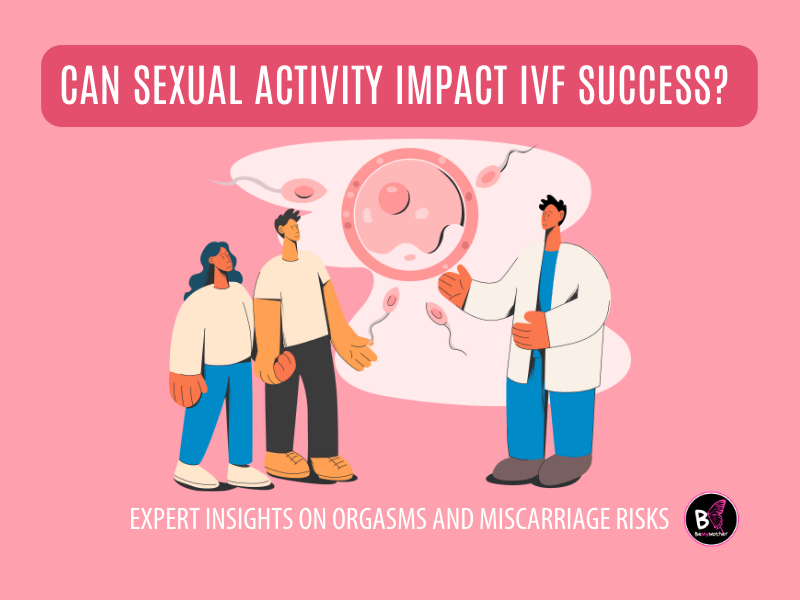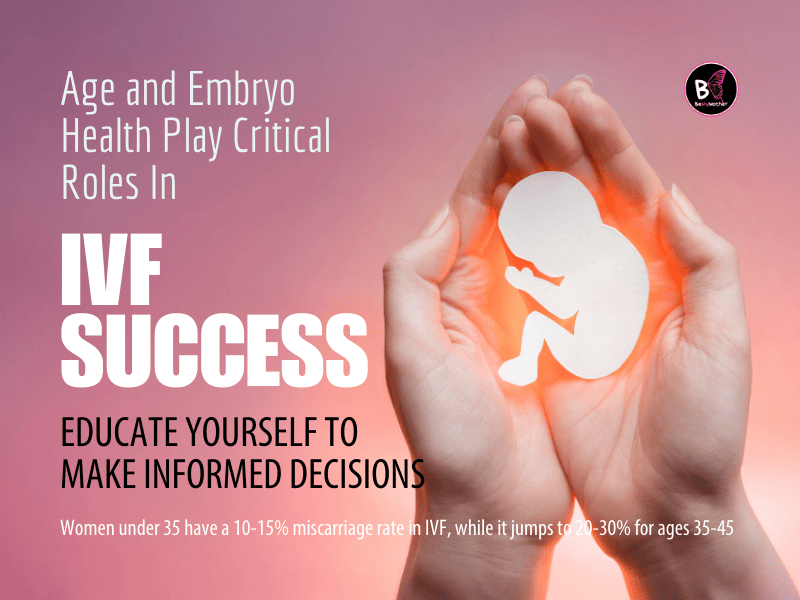The journey of IVF (In Vitro Fertilization) is often filled with hope, anticipation, and a host of questions about what is safe during pregnancy. One question that surfaces frequently is: “Can an orgasm cause miscarriage in IVF?” Understanding the potential risks and debunking common myths is crucial for couples undergoing fertility treatments. This article delves into the science behind orgasms during IVF pregnancies, offering insights supported by research and expert advice. Whether you’re navigating early pregnancy or preparing for IVF, this comprehensive guide provides clarity, reassurance, and actionable advice.
Can an Orgasm Cause Miscarriage in IVF?
An orgasm during IVF treatment does not typically cause a miscarriage in most cases. Scientific research and medical experts agree that the uterine contractions associated with orgasms are usually mild and do not pose a significant risk to an early pregnancy. The embryo is securely implanted in the uterine lining, protected by a robust biological process. However, specific cases, such as high-risk pregnancies or those involving uterine abnormalities, may warrant caution. If you’re undergoing IVF, it’s always best to consult your fertility specialist to understand your unique situation and any precautions you should take to ensure a healthy pregnancy.
Understanding the Connection Between Orgasms and IVF Miscarriages

The concern over orgasms causing miscarriages during IVF is rooted in the physiological changes that occur during climax. Orgasms involve uterine contractions, hormonal shifts, and increased blood flow—all of which are natural and typically harmless in a normal pregnancy. However, IVF pregnancies are more sensitive, raising valid questions about whether these changes could pose risks.
Research by the American Society for Reproductive Medicine (ASRM) shows no direct link between orgasms and miscarriage in IVF pregnancies. However, doctors may advise caution, particularly during critical stages like embryo transfer and early implantation, to minimize any potential risks.
What Happens to the Body During an Orgasm in Early Pregnancy?
During an orgasm, the body experiences:
- Uterine Contractions: Mild and temporary contractions occur in the natural climax response. These are generally not strong enough to impact the implantation or stability of an embryo.
- Increased Blood Flow: Orgasms increase blood flow to the uterus and pelvic region, benefiting overall reproductive health.
- Hormonal Release: The release of endorphins and oxytocin contributes to relaxation and emotional well-being.
In a healthy IVF pregnancy, these effects are usually safe. However, during the early stages of implantation, uterine sensitivity may warrant avoiding intense physical activity, including sexual intercourse.
Potential Risks and Safety Concerns During IVF Pregnancy
IVF pregnancies carry unique risks compared to natural pregnancies. Doctors often recommend avoiding intercourse and orgasms during certain stages, such as:
- Post-Embryo Transfer Period: The first 10-14 days after embryo transfer are crucial for implantation. Even mild uterine contractions could theoretically disturb this process.
- High-Risk Pregnancies: Conditions like multiple pregnancies, uterine abnormalities, or a history of miscarriage may warrant stricter precautions.
Table 1: Stages of IVF Pregnancy and Recommended Precautions
| Stage of IVF | Common Medical Advice Regarding Orgasms |
| Pre-Embryo Transfer | Generally safe unless otherwise advised |
| Post-Embryo Transfer | Avoid intercourse and orgasms for 10-14 days |
| Stable Pregnancy (Weeks 8-20) | Usually safe with doctor’s approval |
| High-Risk Pregnancy | Strictly avoid based on medical guidance |
Orgasm During the First Trimester of IVF Pregnancy
Is it possible to have sexual intercourse during an IVF pregnancy?
The first trimester is critical for establishing a successful pregnancy. While mild uterine contractions from orgasms are unlikely to cause harm, the cautious approach adopted by most IVF specialists stems from a “better safe than sorry” philosophy. For example, a 2021 study published in Fertility and Sterility emphasized that avoiding unnecessary physical or emotional stress during early pregnancy could improve outcomes.
Orgasm During the Second and Third Trimesters of IVF Pregnancy
As pregnancy progresses, the uterus becomes less susceptible to minor contractions caused by orgasms. Most healthcare providers approve sexual activity during these stages unless specific complications arise, such as:
- Placenta Previa: A condition where the placenta covers the cervix, increasing risks of bleeding.
- Incompetent Cervix: A weakened cervix that may not fully support the growing pregnancy.
Regular communication with your healthcare provider is essential to assess risks and receive tailored advice.
Does Female Masturbation Affect Implantation During IVF?
Masturbation’s impact on IVF implantation is another frequent concern. The uterine contractions caused by self-stimulation are similar to those experienced during intercourse and are typically mild. A 2020 study from the National Institute of Child Health and Human Development found no significant evidence that masturbation affects implantation rates in IVF patients. However, moderation is key; any unusual symptoms should be reported to your doctor immediately.
When Are IVF Pregnancies Most at Risk of Miscarriage?

The highest risk of miscarriage in IVF pregnancies occurs during the first trimester. Contributing factors include:
- Chromosomal Abnormalities: A leading cause of early pregnancy loss.
- Hormonal Fluctuations: Progesterone levels are critical for maintaining early pregnancy.
- Lifestyle Factors: Smoking, excessive caffeine, and stress can increase risks.
Table 2: Common Causes of IVF Miscarriages and Their Timeframes
| Cause of Miscarriage | Typical Timeframe |
| Chromosomal Abnormalities | Weeks 1-12 |
| Uterine Abnormalities | Weeks 5-20 |
| Cervical Insufficiency | Weeks 12-24 |
Struggling with PCOS and worried about pregnancy complications? Learn 10 expert-backed strategies to reduce miscarriage risk and embrace a smoother path to motherhood. How to Avoid a Miscarriage with PCOS
Does Orgasm Bring on Labor or Preterm Labor?
The idea that orgasms induce labor stems from the release of oxytocin, which can stimulate uterine contractions. However, these contractions are typically mild and short-lived. According to the Journal of Obstetrics and Gynecology Research, there is no direct evidence linking orgasms to preterm labor in low-risk pregnancies.
Can Orgasms Harm the Fetus in IVF Pregnancies?
Fetal safety is a top concern for expecting parents. The amniotic sac, uterine walls, and mucus plug act as protective barriers, shielding the fetus from external pressures. Orgasms are unlikely to harm the fetus unless complications like placental issues or infections are present. Always seek personalized medical advice to address specific concerns.
Psychological and Emotional Benefits of Intimacy During IVF Pregnancy
Intimacy during pregnancy offers psychological benefits, including reduced stress and strengthened partner bonds. A 2019 review in Psychological Health found that maintaining emotional closeness positively affects mental health during pregnancy, contributing to overall well-being. Safe practices, such as avoiding deep penetration or excessive exertion, can help mitigate risks.
Recovering after a miscarriage is not just about emotional healing—hormonal balance plays a critical role in your journey. How to Regulate Hormones After Miscarriage: Discover 9 Proven Steps to Recovery to restore hormonal harmony and pave the way for a healthier pregnancy.
FAQs
1. Can an orgasm during IVF pregnancy cause a miscarriage?
Orgasms are generally safe during IVF pregnancies, but doctors may recommend avoiding them during critical periods like the post-embryo transfer phase.
2. Are uterine contractions from orgasms harmful to the embryo?
Mild uterine contractions are natural and usually harmless. However, doctors may advise avoiding activities that trigger uterine activity during early implantation.
3. Should sex be avoided during IVF pregnancy?
Sex is often safe but should be avoided during sensitive stages like post-embryo transfer or if complications arise. Always consult your healthcare provider.
4. Can orgasms harm the fetus?
The fetus is well-protected, and orgasms are unlikely to cause harm unless complications like placental issues exist.
5. Does masturbation affect IVF success?
Masturbation does not significantly impact IVF success but should be moderated during implantation.
Conclusion
Can an orgasm cause miscarriage in IVF? The answer is nuanced. While orgasms are generally safe for most IVF pregnancies, it’s crucial to follow your doctor’s advice during sensitive stages like implantation. Understanding the risks and benefits can help you make informed decisions, ensuring physical and emotional well-being throughout your journey.
Miscarriage can be overwhelming, but understanding its complications is vital. Could there be a link between miscarriage and UTIs? Find out in our detailed guide: Can Miscarriage Cause UTI? 8 Eye-Opening Facts About Miscarriage and UTIs You Can’t Ignore.



